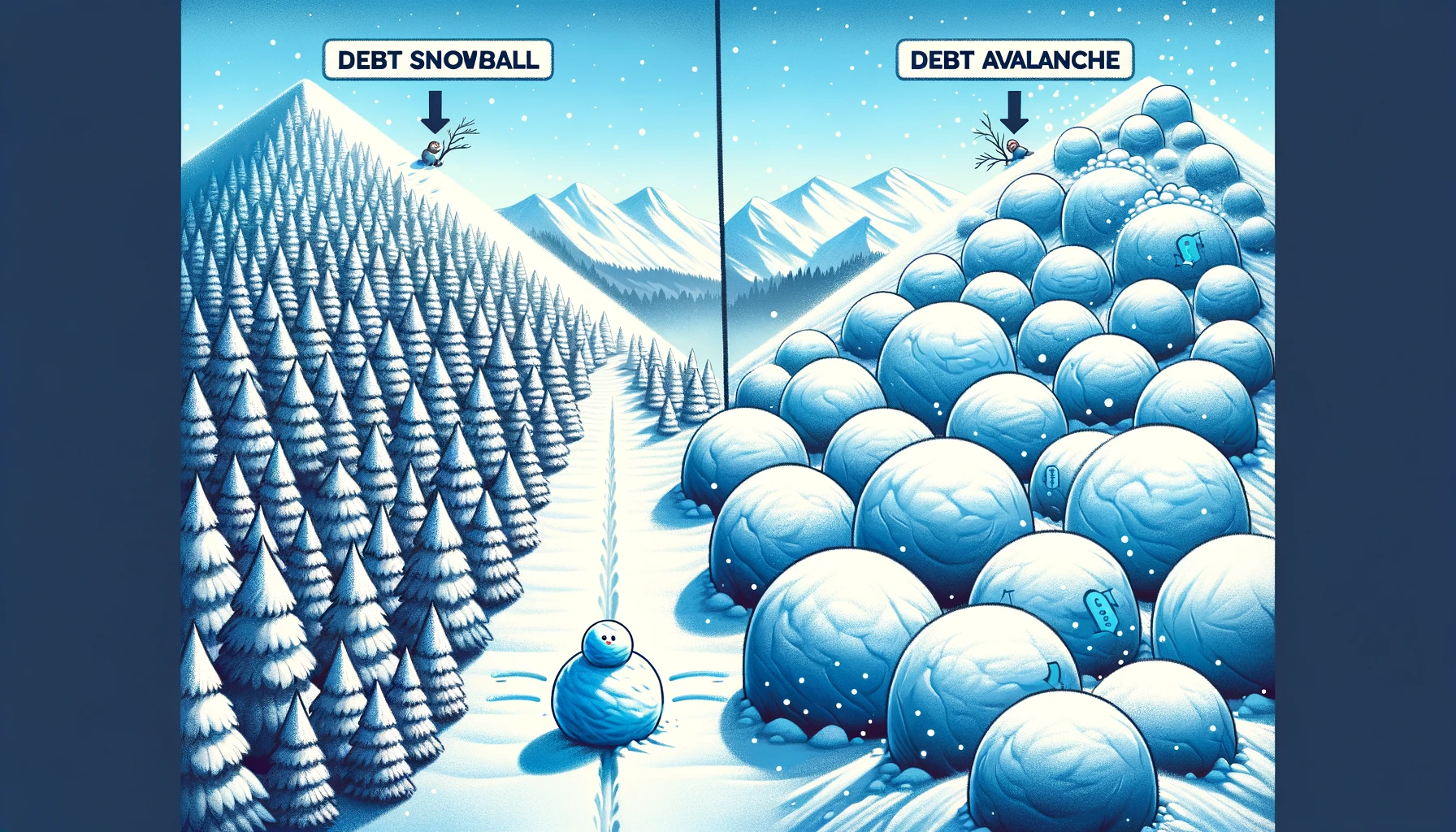Debt can feel suffocating, like a weight that hangs heavily on your shoulders. It seems like no matter how hard you work, the numbers just keep stacking up against you. But take heart; there is hope. By evaluating your current financial situation, assessing your overall debt load, and identifying unnecessary expenses or habits that contribute to your indebtedness, you can start taking concrete steps towards reducing your debt each month.
Picture this: a future where those credit card bills no longer haunt you every time they land in the mailbox. A life without the constant stress of wondering how you’ll make ends meet while still chipping away at that mountain of debt. A world where financial freedom becomes more than just an elusive dream but a tangible reality.
But how do we get there? How do we break free from the shackles of debt and achieve true financial independence? In this article, we will dive deep into proven ways to reduce your debt each month – strategies and tips that have helped countless individuals regain control over their finances.
So if you’re tired of living paycheck to paycheck and want to find practical solutions for decreasing your monthly payments while making steady progress towards being debt-free, then keep reading. These insights will shed light on areas where you may not have realized your spending habits were causing damage and provide actionable steps to kickstart your journey towards long-term financial stability. Let’s embark on this transformative voyage together!
Create a Realistic Budget
One of the most important steps in reducing your debt each month is to create a realistic budget. This involves taking an honest look at your income and expenses to determine how much money you can allocate towards paying down your debts. It may require some sacrifices and adjustments, but it is crucial in order to make progress towards becoming debt-free.
Start by listing all of your sources of income, including any side hustles or additional streams of revenue. Then, gather all of your financial statements and bills to get a clear picture of your monthly expenses. Be sure to include both essential costs like rent/mortgage payments, utilities, groceries, and transportation as well as non-essential expenditures such as entertainment or eating out.
Once you have a comprehensive list of both your income and expenses, compare the two. This will give you an idea of how much discretionary income you have left over after covering all necessary obligations. From there, prioritize high-interest debts while still ensuring that you are making the minimum payment on other credit cards or loans.
By creating a realistic budget that focuses on prioritizing high-interest debts first, you’ll be able to allocate more funds towards paying off these costly balances faster. Over time, this approach will help lower the overall amount owed and significantly reduce interest charges—putting yourself on track for financial freedom sooner than expected. Remember that consistency is key when it comes to sticking with this plan – every dollar counts! So make sure that any surplus funds go directly towards reducing outstanding debt each month rather than being spent elsewhere unnecessarily.
Negotiate Better Terms
Negotiating better terms with creditors is a powerful strategy that can significantly reduce your debt burden each month. Many people assume that creditors are inflexible and unwilling to negotiate, but the truth is that they often have more room for negotiation than you might think.
Start by contacting your lenders or credit card companies and explaining your financial situation. Be honest about your struggles and make it clear that you are committed to repaying your debts. This initial conversation lays the foundation for open communication and sets the stage for potential negotiations.
When discussing repayment options, focus on two key areas: interest rates and flexible payment plans. Lowering the interest rate on your debts can save you a substantial amount of money over time, allowing you to pay off your debts faster. Additionally, requesting a more flexible payment plan, such as extending the repayment period or temporarily reducing monthly payments, can help ease financial strain in the short term.
Remember, negotiation is all about finding common ground and reaching mutually beneficial agreements. Approach these conversations with confidence, armed with knowledge of competitive interest rates or alternative payment plans offered by other lenders. By showing that you have done your research and presenting logical arguments for why they should offer better terms, you increase your chances of success.
Don’t be discouraged if not every creditor agrees to renegotiate; some may be more willing than others. It’s important to remain persistent and explore all possible options before settling on an agreement. The efforts put into negotiating better terms with creditors will undoubtedly pay off in lower monthly debt payments and increased financial freedom in the long run.
Consider Consolidation Options
One effective strategy to reduce your debt each month is to explore consolidation options. This involves taking multiple debts, such as credit card balances or personal loans, and consolidating them into a single loan or credit line with a lower interest rate. By doing so, you can simplify your debt repayment process and potentially save money on interest charges.
One popular method of consolidation is through a balance transfer credit card. These cards offer an introductory period with 0% APR on transferred balances, allowing you to pay off your debts without accruing any additional interest for a certain period of time. This can be particularly beneficial if you have high-interest credit card debt that is causing your monthly payments to skyrocket.
Another option for consolidation is obtaining a personal loan from a reputable lender. Personal loans often have lower interest rates compared to credit cards, making it easier for you to chip away at your debt. Additionally, consolidating multiple debts into one payment simplifies the repayment process and helps you stay organized.
By considering consolidation options, not only can you potentially reduce the amount of interest paid each month but also streamline your budgeting efforts by focusing on just one payment instead of several different creditors. It’s important to carefully evaluate the terms and conditions associated with any consolidation option before committing, ensuring that it aligns with your financial goals and offers true long-term benefits in reducing your overall debt burden each month.
Cut Back On Spending
Cutting back on discretionary spending is one of the most effective ways to reduce debt each month. By identifying areas where you can cut expenses, such as dining out, entertainment, and shopping, you can free up more money to put towards paying off your debts. This may mean making some sacrifices in the short term, but it will ultimately help you achieve your long-term financial goals.
Start by taking a close look at your spending habits and identify any unnecessary expenses. Do you really need that daily $5 latte from the coffee shop? Could you substitute dining out for cooking meals at home? Are there subscription services or memberships that aren’t providing enough value to justify their cost?
Once you’ve identified these areas for potential savings, create a realistic budget and stick to it. Set limits for yourself in different categories of discretionary spending and find creative alternatives that are more affordable or even free. For example, instead of going out to eat with friends every weekend, consider hosting potluck dinners where everyone brings a dish.
Remember that cutting back on discretionary spending doesn’t mean completely depriving yourself of all enjoyment. It simply means being mindful of how much money you’re allocating towards non-essential items and finding ways to prioritize your financial well-being over temporary indulgences.
With consistent effort and discipline in reducing discretionary expenses, you’ll not only see immediate results in terms of freeing up funds for debt repayment but also develop healthier financial habits that will serve you well beyond becoming debt-free.
Increase Your Income
One effective way to reduce your debt each month is to increase your income. While it may sound obvious, many people overlook this simple yet powerful strategy. By finding additional sources of income, such as part-time jobs or freelance work, you can bring in extra money that can be used specifically for paying off debts.
Take a moment to consider any skills or talents that you possess that could be monetized. Are you particularly good at writing? Consider offering freelance writing services on platforms like Upwork or Fiverr. Do you have a knack for graphic design? Offer your services on websites like 99designs or Freelancer.
Another option to explore is taking up a part-time job in the evenings or weekends. This could be anything from working as a server in a restaurant to delivering groceries as an independent contractor for a food delivery service. While it may require some extra time and effort, the additional income generated from these endeavors can significantly boost your ability to pay off debt faster.
Remember, increasing your income doesn’t have to be permanent – it’s simply about getting ahead financially by generating more cash flow during this critical time when reducing debt is of utmost importance.
Reduce Interest Charges Through Early Repayments
One effective strategy to reduce your debt each month is by making extra payments towards credit card debts that carry high-interest rates. By paying off these debts early, you can significantly decrease the amount of interest that accrues over time, ultimately saving yourself money in the long run.
Credit cards often charge exorbitant interest rates, sometimes reaching as high as 25% or more. This means that even a small balance on your credit card can quickly accumulate substantial amounts of interest if left unpaid. However, by making additional payments beyond the minimum required amount each month, you can chip away at the principal balance faster and minimize your exposure to compounding interest.
For example, let’s say you have a credit card with a $5,000 balance and an annual percentage rate (APR) of 20%. If you only make minimum monthly payments of around $100 per month, it could take years—possibly decades—to pay off this debt completely. During that time, you would end up paying thousands in unnecessary interest charges. However, if you were to increase your monthly payment to $300 or more and consistently make extra contributions towards reducing the outstanding balance, not only would you be able to clear off the debt sooner but also save considerably on accumulated interests.
By taking control of your finances and actively working towards reducing high-interest credit card debts through early repayments, you are effectively cutting down on unnecessary expenses while also demonstrating discipline and responsibility in managing your financial well-being. This approach empowers individuals like yourself to regain control over their finances and work towards becoming debt-free faster
Increase Payment Frequency: Break Free from Monthly Payments
If you’re looking for an effective way to reduce your debt more quickly, consider switching from monthly payments to a bi-weekly or weekly schedule. While it may seem like just a minor adjustment, the impact can be significant.
Traditionally, most people make their debt payments on a monthly basis. However, by making smaller and more frequent payments, you can actually save money on interest and pay off your debts faster. Let’s break it down.
When you make monthly payments, your interest is calculated based on the average balance of your debt throughout the month. By increasing payment frequency to bi-weekly or weekly intervals, you are reducing that average balance and therefore decreasing the amount of interest that accrues each month.
For example, let’s say you have a $5,000 credit card balance with an annual interest rate of 18%. If you were to make only the minimum monthly payment of $100 per month, it would take you nearly 7 years to fully repay this debt. However, if you switch to bi-weekly payments of $50 (which equals $100 per month), not only will you pay off the debt in just over 4 years but also save approximately $500 in interest charges! That’s real money back in your pocket!
Increasing payment frequency isn’t just about saving money on interest; it also helps build discipline into your financial habits. Making smaller and regular payments throughout the month encourages better budgeting as well as keeps your debts at top of mind consistently.
Take control of your repayment journey by breaking free from those conventional monthly schedules – embrace bi-weekly or even weekly payment frequencies instead. The small sacrifices today will lead to big gains tomorrow!
Seek Professional Help If Necessary
Consult credit counseling agencies or financial advisors for personalized guidance.
If you find yourself overwhelmed by your debt and unsure of where to start, don’t hesitate to seek professional help. Credit counseling agencies are a valuable resource that can provide personalized guidance based on your unique financial situation. These professionals are trained to analyze your debt, create a budget, negotiate with creditors on your behalf, and develop a repayment plan that works for you.
Financial advisors also offer expert advice and can help you devise a strategy to reduce your debt each month. They have the knowledge and experience to assess your overall financial health, identify areas where you can cut back on expenses, suggest investment opportunities that may generate additional income, and guide you in making informed decisions about managing your debts.
While seeking professional assistance does come at a cost, it is often well worth it when considering the potential savings in interest payments and the peace of mind that comes from having an experienced advocate work on your behalf. Remember that these professionals have dealt with countless individuals facing similar challenges and can provide insights and strategies that may not be readily apparent to someone without their expertise. Don’t hesitate to reach out for help if needed; there’s no shame in asking for assistance when it comes to managing your finances effectively
Stay Motivated and Celebrate Milestones
One of the keys to successfully reducing your debt is maintaining motivation throughout the process. It can be easy to get discouraged when faced with a mountain of debt, but tracking your progress and celebrating milestones along the way can help keep you focused and inspired.
Set small goals for yourself, such as paying off a certain percentage of your debt or reaching a specific dollar amount reduction each month. As you meet these goals, take time to acknowledge your achievements and reward yourself in some way. Maybe it’s treating yourself to a nice dinner or buying something special that you’ve been wanting for a while. By recognizing your progress and giving yourself tangible rewards, you’ll feel motivated to continue working towards becoming debt-free.
Another effective tactic is visualizing the end result. Create a vision board or find images that represent what life will look like once you’ve paid off all your debts. Seeing these reminders every day will serve as powerful motivators during times when the journey feels challenging.
Lastly, seek support from others who are on similar journeys or have already achieved their goal of being debt-free. Online communities and forums can provide encouragement, advice, and success stories that remind you it is possible to make significant strides toward financial freedom.
Remember, reducing your debt takes time and perseverance, so it’s important to stay positive as much as possible throughout the process.Patience combined with an optimistic mindset will help propel you forward even when faced with setbacks along the way.
By staying motivated and celebrating milestones along your journey towards reducing your debt, you’ll not only maintain momentum but also enjoy small victories that bring joy amidst an otherwise challenging undertaking






